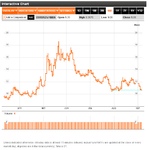Well I hadn't heard it before, and Junker was just talking about it. Missed the boat... I dunno, my strategy is "sell eur/usd if something bad comes out of europe", and who is to say that all the bad news is done with? It's just the end of silly season, no reason why we shouldn't continue from where we left off.
Also, I reckon the next "flavor of the month" could be the new Basel III stuff, which could hurt banks, and hopefully pull eur/usd lower with it.
Also, I reckon the next "flavor of the month" could be the new Basel III stuff, which could hurt banks, and hopefully pull eur/usd lower with it.

